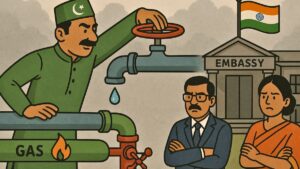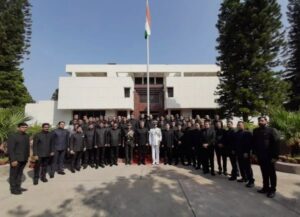Pakistan cuts gas water to Indian High Commission — A Vienna Convention Violation
Pakistan cuts gas water to Indian High Commission Diplomats in Islamabad: Tensions Rise After Operation Sindoor and now it’s height of being low by Pakistan.
What is the context of Pakistan cuts gas water to Indian High Commission ?
After the Pahalgam terror attack earlier this year, India carried out Operation Sindoor targeting terror camps in Pakistan-administered areas. Soon after, India suspended the Indus Waters Treaty—a 1960 agreement that shared river waters between the two nations.
Pakistan has been struggling to respond. And now, reports say Islamabad has gone a step further by cutting off basic supplies to Indian diplomats living and working in the Indian High Commission in Pakistan’s capital.
What Exactly Happened?
For the past few days, local vendors in Islamabad have been told not to deliver certain basic items to the Indian High Commission.
The reported restrictions include:
1. Cooking Gas: The Sui Northern Gas Pipelines, which supply piped gas to the High Commission, have stopped service. Even gas cylinders from local sellers are being denied.
2. Drinking Water: Mineral water deliveries have been blocked, forcing diplomats to rely on tap water, which is often unsafe without filtration.
3. Newspapers: Local distributors have been told not to deliver newspapers to the mission or diplomats’ homes, cutting them off from local news and perspectives.
Indian officials say this is more than an inconvenience — it’s a deliberate attempt to harass and isolate diplomats.

The Vienna Convention Violation in Pakistan cuts gas water to Indian High Commission
The Vienna Convention on Diplomatic Relations (1961) is the rulebook for how countries should treat each other’s diplomats. Pakistan, like India, is a signatory to it.
Here’s what the treaty says:
Article 22: The premises of a diplomatic mission (like the High Commission) are inviolable.
Article 25: The host country must provide facilities so diplomats can work normally.
Article 27: Secure communication and access to essentials must not be blocked.
By cutting off water, gas, and newspapers, Pakistan is directly violating these obligations, Indian officials say.
Why Pakistan cuts gas water to Indian High Commission ?
Sources suggest this is “petty retaliation” for recent Indian actions — especially Operation Sindoor and the suspension of the Indus Waters Treaty.
Some reports also point to Pakistan’s ISI intelligence agency being involved in ordering these restrictions. While Islamabad officially denies the claims, the timing suggests otherwise.
India’s Possible Response after Pakistan cuts gas water to Indian High Commission
India has already taken one step — restricting newspaper deliveries to Pakistani diplomats in New Delhi. But officials say stronger retaliation is possible if the restrictions in Islamabad continue.
Potential actions could include:
- Limiting amenities for Pakistani diplomats in India.
- Raising the issue at the United Nations and other global forums.
- Using back-channel talks or third-party mediation to resolve the issue.
How This Affects Diplomacy
Such actions make it harder for diplomats to work, hold meetings, and maintain even minimal cooperation. It also hardens public opinion on both sides, making de-escalation more difficult.
Similar tit-for-tat actions have happened before — like when airspace was closed after the Balakot airstrikes in 2019. Once these retaliations start, it’s hard for either side to roll them back without looking weak.

What Could Happen Next?
Diplomatic experts say there are a few possible paths forward:
Direct Talks – Both countries quietly agree to restore normal supplies.
Third-Party Mediation – Another country or organisation steps in to ease tensions.
International Pressure – India publicly accuses Pakistan of treaty violations to force change.
Continued Tit-for-Tat – Both sides escalate, further harming relations.
Right now, with both governments under domestic pressure, option 4 looks most likely.
The Bigger Picture behind this Pakistan cuts gas water to Indian High Commission
While the blocking of gas and water might seem small compared to military action, it’s a clear signal of how low diplomatic ties have fallen.
When even basic amenities for diplomats are targeted, it shows that political tensions have reached a point where the rules of diplomacy are being ignored. And as history shows, once such steps are taken, it’s hard to turn back.
Read Also: Pakistani Army Chief in America Threats to Destroy Indian Dams on Indus River
